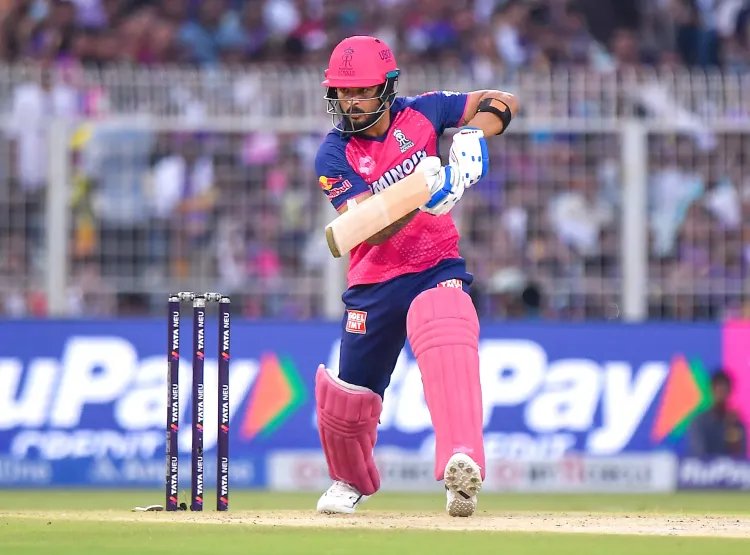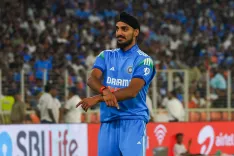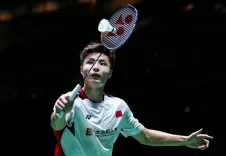How Can Fitness Give You an Edge All Year Round? Riyan Parag’s Insights

Synopsis
Key Takeaways
- Fitness is a year-round commitment for cricketers.
- Training should focus on both match fitness and personal fitness.
- Recovery plays a critical role in maintaining optimal performance.
- Nutrition and sleep are essential components of an athlete's regimen.
- Intermittent fasting can help athletes manage weight and energy levels.
New Delhi, July 19 (NationPress) The intense requirements for cricketers to compete across all three formats throughout the year have made optimal fitness a necessity. As India’s all-rounder Riyan Parag states, staying fit as a cricketer is now an ongoing endeavor that provides a vital advantage over fellow competitors.
“You need to commit to it throughout the year. There are no off-seasons or breaks for the body, at least. While we may have breaks in cricket, where tournaments and matches are absent,” he explained.
“However, by training every day, eating nutritious meals, and maintaining a disciplined regimen, you gain that competitive edge and keep your body ready for all formats of the game,” Riyan shared during an exclusive interview with IANS at the PUMA x HYROX event on Saturday.
With nearly 2600 participants from India and 39 other nations attending the fitness racing event, Riyan expressed his enthusiasm. “It’s thrilling to see this level of participation. My career has shown me how crucial fitness has become. Observing so many individuals competing and supporting each other is inspiring. This global event’s arrival in India is a tremendous opportunity for us.”
The success Riyan has achieved — including the 2018 U19 World Cup, leading Assam in domestic cricket, solidifying his place with the Rajasthan Royals, and representing India in white-ball formats — is rooted in a rigorous and dedicated approach to fitness, which began when he was just 11 years old.
“Fitness is essential. As a professional athlete, I understand its significance, but for everyone, integrating fitness into daily life is beneficial. I started my fitness journey at 11 because I realized that mastering my fundamentals was crucial to excel in my field,” he said.
Does beginning fitness training early provide an advantage over teammates in pursuit of a professional sports career? Riyan confirmed this but acknowledged that many young cricketers are more agile and fit than ever, emphasizing the importance of training privately.
“Absolutely, it gives you an edge. However, with the current generation of young cricketers prioritizing fitness, everyone possesses that advantage. To stand out, one must train when no one is observing and put in the extra effort,” he remarked.
“Participating in events like this allows you to take valuable lessons home and strive for improvement daily. This consistent effort undoubtedly gives you an edge,” he added.
Riyan also discussed the distinction between fitness routines on match days versus non-game days, explaining how he strikes this balance. “It requires extensive and targeted training. While match fitness and personal fitness differ, excelling in both is necessary.”
“As professional athletes, if you’re asked to wake up at 5 AM for a 2km run before a match, you must be prepared for that. Training should mimic such demands,” he advised.
“You should wake up early, run 2km, and then practice. It’s a blend of both aspects, but ultimately, you have to embrace the commitment to training required to succeed as a professional athlete.”
While rigorous training is vital, recovery is equally important for cricketers to sustain optimal fitness. In an era dominated by late-night activities and lengthy travel, Riyan emphasized the importance of quality sleep for recovery.
“I aim for 8 to 8.5 hours of sleep. I believe sleep is crucial for calorie burning; it’s not just recovery. After a restorative night’s sleep, I feel prepared for any match, regardless of the time,” he noted.
In terms of nutrition, Riyan balances enjoyment with purpose, practicing intermittent fasting to stay light and energized on the field. “I’m not overly strict with my diet; I enjoy food. However, during the season, I practice intermittent fasting,” he explained.
“I typically consume one or two meals a day, which helps me feel lighter and more energetic for practice. Off-season, I indulge more, maintaining a healthy balance that keeps me satisfied so I can adhere to a diet during the season,” he concluded.







